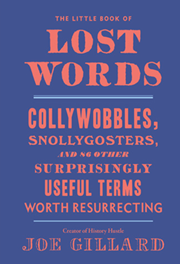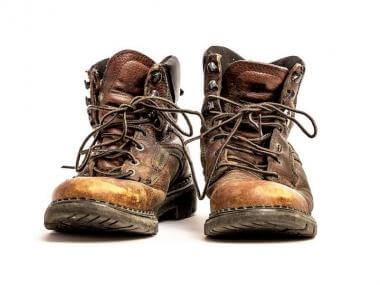Why Do We Say ‘Maverick’?
Joe Gillard, author of “The Little Book of Lost Words,” discusses the unique origin of the word “maverick.”
The sound and shape of the word “maverick” fits its definition so well that to see it on the page, or hear it spoken, summons up a feeling of righteous insubordination. It’s defined by Merriam-Webster as “an independent individual who does not go along with a group or party.” It proudly and defiantly calls out its independence, as if it exists purely to live up to its own definition. Rebellious, a little romantic, and certainly gritty—some would say uniquely American. Maverick.
Buy Now

Study its history and you will see what makes this English word really interesting. Maverick was a family name—a name that somehow made its mark in history more than once throughout its chronology. Through the actions of strong-willed, nonconforming idealists, “maverick” branded itself in our language for representing not only a rebel mindset but a rebel heart, too. As you’ll see, mavericks stand up for what they believe is right, defiant in the face of the crowd.
Samuel Maverick
Our story starts with Samuel Maverick, a Texas lawyer, politician, and land baron born in 1803. Maverick was deeply involved in the Texas Revolution. He was one of the signees of the Texas Declaration of Independence, forming the Republic of Texas (later annexed by the United States). But despite his rebellious politics, it wasn’t until later in his life that he made his mark on the language.
Mavericks stand up for what they believe is right, defiant in the face of the crowd.
Maverick had purchased quite a bit of land in Texas, and in some cases, had received cattle as payment. But Maverick had no interest in owning cattle. It wasn’t his thing. Land was his thing. Nevertheless, he now owned cattle. And though it was customary to brand cattle with a hot branding iron to mark them as your own, Maverick refused. He claimed he didn’t want to be cruel to the animals by inflicting pain on them.
Thus, a “maverick” became a term for an unbranded cow. To this day, as a result of Samuel Maverick’s act of compassionate defiance, the word “maverick” lives on to describe a rebel.
It should be noted, however, that many people claimed Maverick’s reasons for not branding cattle were so he could claim all unbranded cattle as his own. There’s always a cynic.
The Story Continues
Samuel Maverick’s grandson, Maury Maverick, was also a bit of an idealistic rebel. And he is said to have coined the term “gobbledygook” (Shakespeare would have loved this family), a word which also made its way into modern English to describe nonsense language and unnecessary technical jargon.
Maury Maverick began his career in law, but he also served in the infantry in World War I, earning a Silver Star and a Purple Heart. He was elected to the U.S. Congress in 1934, and a young Lyndon Johnson worked on his campaign. But Maury Maverick faced opposition from conservative Democrats when he chose to strongly back President Roosevelt’s New Deal programs.
[Maury Maverick] is said to have coined the term ‘gobbledygook.’ (Shakespeare would have loved this family.)
One thing Maury Maverick hated was bureaucratic language. He hated it so much that he wrote a memo where he joked, “anyone using the words ‘activation’ or ‘implementation’ will be shot.” It was in this memo that he coined the term “gobbledygook” to refer to such infuriating language.
Maury Maverick’s son, Maury Maverick Jr., continued the family firebrand tradition. Maury Jr. served in World War II, and was also elected to the Texas House of Representatives. It was here that he built a reputation as a liberal, championing labor movements and civil rights.
After serving in state congress, Maury Jr. practiced law for the American Civil Liberties Union, defending the rights of protesters, communists, and other groups that faced scrutiny during the Vietnam War era.
Maury Jr. is not known for coining any terms himself, but he’s still a maverick.
So there you have it. The Maverick family branded their name (metaphorically) onto U.S. history and the English language like no other. Some of you real word nerds out there may be wondering where the family name came from, etymologically. That’s something you can research further on your own, but there are whispers around the web that it may be rooted in Celtic as “Mawr-rwyce,” related to Maurice, which means “a valiant hero.”
Now wouldn’t that be fitting?
Sources:
NPR: Original ‘Maverick’ Was Unconventional Texan
Biographical Directory of the United States Congress: MAVERICK, Fontaine Maury, (1895 – 1954)
The New York Times: Maury Maverick Jr., 82, Champion of the Unpopular





